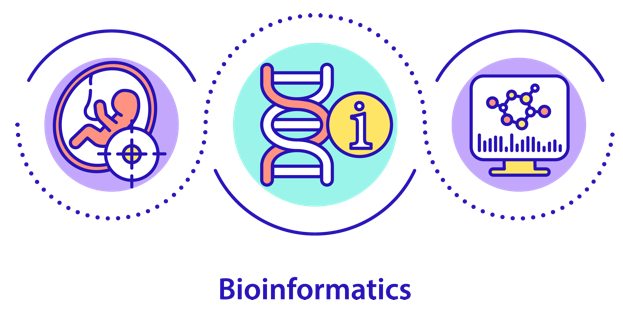Bioinformatics Tutor for Beginners
Bioinformatics Tutor for Beginners
Blog Article
The Best Strategy To Use For Bioinformatics Tutor
Table of ContentsNot known Incorrect Statements About Bioinformatics Tutor Not known Facts About Bioinformatics TutorGet This Report on Bioinformatics TutorEverything about Bioinformatics TutorThe Definitive Guide to Bioinformatics Tutor
Of the overall participants associated with the training, 80% were trainees from public greater education institutions, while the continuing to be 20% originated from personal organizations. To qualify for a certification of involvement, trainees were required to participate in at the very least 90% of the overall training hours. As a result of this need, a remarkable 95% of the individuals efficiently obtained their certificates, having not only fulfilled the minimum participation criteria but additionally finished all designated activities throughout the training.
Throughout the height of the COVID-19 pandemic, especially between June and August 2020, the task team was entrusted with organizing specialized training in bioinformatics. This training was specifically focused on students from the research team Core for Research study in Applied Computing at the Federal University of Pará (UFRA) The adaptation to remote learning platforms as a result of the pandemic created a possibility to explore new training approaches and electronic devices that improved both reach and performance.
This program was created to give an available yet detailed summary of Artificial Intelligence methods, especially as used in bioinformatics (Bioinformatics Tutor). This virtual layout allowed engagement from students throughout Brazil, many of whom could not have had the opportunity to participate in in-person sessions.
What Does Bioinformatics Tutor Do?
Roughly 50% of the overall training hours were dedicated to useful tasks where pupils developed intelligent designs and applications in a variety of clinical domains, including genetics, molecular biology, and environmental data analysis. These platforms enabled students to engage in real-time data manipulation, model training, and algorithm experimentation.
Sixty of them were associated with different higher education institutions in the state of Pará, while the remaining twenty came from establishments situated in 5 various other Brazilian states. By introducing Artificial Knowledge in a relevant and sensible context, the effort served to bridge the void in between theory and real-world application, giving pupils with a solid structure for future study or work in the area.
The training effort formed component of a wider academic outreach effort referred to as the Bioinformatics when traveling project. This job has, throughout the years, presented dozens of pupils to the world of bioinformatics and computational biology. The occasions held under this umbrella initiative have taken area across numerous regions and years, as summarized in Table 1 (Checklist of events, areas, years, and overall varieties of students and teachers)
One of one of the most amazing end results of the Bioinformatics on the Road campaign has actually been its contribution to the growth of decentralized research groups. Numerous of these groups, at first additional hints united by their involvement in training occasions, have actually because gone on to create independent clinical study in collaboration with regional scholastic establishments. The training not just fostered scientific reasoning within the context of bioinformatics but also stimulated joint relationships that prolonged past the training setting. These partnerships have actually led to boosted neighborhood scientific performance and contributed meaningfully to the development of the wider bioinformatics area in Brazil.
The Facts About Bioinformatics Tutor Revealed
The project itself was conceptualized and organized by megabytes and RR, that managed the preparation and execution of each action. Lectures were provided by a multidisciplinary group containing MB, FA, EF, KP, JS, DM, SN, LP, LG, IH, air conditioning, and rr. The same group, excluding IH and RR, additionally worked as tutors for the practical training components. Financing for the task was given via the give 88887.200562/ 2018-00 from CAPES. The writers expand their gratefulness to everyone that contributed to the awareness of this task, whether straight or indirectly, considering that its beginning.
The Federal University of Pará's Office of Research study (PROPESP/UFPA) also offered financial support, particularly for the manufacturing of the final manuscript. The writers state no financial or commercial problems of passion that can have affected the research. Furthermore, all point of views and analyses shared in this article are solely those of the writers and do not always mirror those of their particular institutions, the author, editors, or reviewers entailed in the publication process.

How Bioinformatics Tutor can Save You Time, Stress, and Money.
From an instructional viewpoint, the training technique utilized in the training was deliberately interactive. Classes were carried out in a manner that encouraged pupil engagement and conversation, exceeding memorizing memorization to discover just how concepts are established, used in day-to-day life, and examined in scholastic setups. The educational approach concentrated on nurturing both solid and having a hard time trainees, offering individualized support, and structure self-confidence with sustained mentorship and perseverance.

Each group, including about 36 individuals, was sustained by three mentors-- a lot of whom were postdoctoral scientists with customized know-how. These advisors not only helped create the team tasks but likewise promoted their implementation, guaranteeing that each research study question was both relevant and suitably difficult. The goal was to supply a naturally sensible context that participants can check out through open-ended purposes and accessibility to curated datasets.
For additional understandings right into the approach and outcomes of this project-based learning strategy, visitors are directed to S1 Text, which consists of in-depth descriptions of the instructional framework, analysis methods, and job themes utilized in the training sessions.
Excitement About Bioinformatics Tutor
Of the total individuals involved in the training, 80% were pupils from public higher education and learning establishments, while the staying 20% came from exclusive organizations. To certify for a certificate of participation, pupils were required to participate in at the very least 90% of the overall training hours. Notably, beyond the students who registered in the training sessions, 7 seasoned teachers participated in delivering the courses, while three devoted research study professors Recommended Reading worked with the overall training procedure. Around 50% of the overall training hours were dedicated to functional activities where pupils built intelligent designs and applications in a range of scientific domain names, consisting of genes, molecular biology, and ecological data evaluation. The training not just promoted scientific thinking within the context of bioinformatics yet likewise stimulated joint partnerships that extended past the training setting.
Report this page